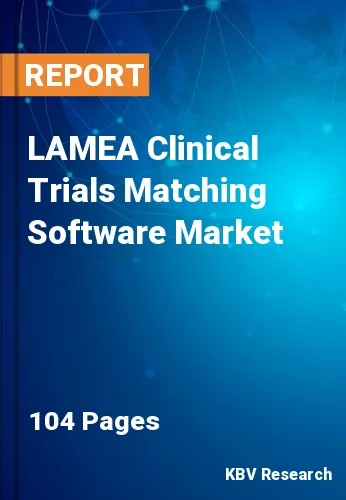The Latin America, Middle East and Africa Clinical Trials Matching Software Market would witness market growth of 16.6% CAGR during the forecast period (2023-2030).
The market is expected to grow due to increasing clinical trial complexity and the need for more efficient patient recruitment. Factors such as the growing volume of healthcare data and advances in AI technology are driving this growth. The adoption of clinical trial matching software face challenges related to data privacy, interoperability of healthcare systems, and regulatory compliance, especially with the implementation of laws like GDPR and HIPAA.
Many clinical trials matching software solutions must adhere to regulatory requirements, including patient privacy and data security. Compliance with regulations such as the Health Insurance Portability and Accountability Act (HIPAA) in the United States and the General Data Protection Regulation (GDPR) in Europe is crucial. The rise of precision medicine has had a profound impact on the growing adoption of clinical trials matching software. Precision medicine, which tailors medical treatment and interventions to individual patient characteristics, including genetics, biomarkers, and clinical data, has ushered in a new era of targeted therapies and personalized healthcare.
As treatments become more specific and focused on particular patient subgroups, the need for precise patient-patient matching with clinical trials has become paramount. Clinical trials matching software plays a pivotal role in this context by efficiently and accurately identifying patients whose genetic or molecular profiles align with the eligibility criteria of specialized trials. This technology ensures that participants in precision medicine trials are not only more likely to benefit from the intervention but also contribute valuable data to the development of these groundbreaking therapies.
The need for clinical trials management software (CTMS) in Latin America is growing due to several factors that make the region an attractive destination for clinical research. CTMS solutions are vital in addressing the specific challenges and requirements of conducting clinical trials in Latin America. The region offers access to diverse patient populations across various ethnicities, genetic backgrounds, and disease demographics. This diversity is valuable for clinical trials that require representation from different groups. Latin American countries are modernizing their healthcare systems, including adopting electronic health records (EHRs) and telemedicine. CTMS solutions that integrate with these systems are increasingly relevant.
The Brazil market dominated the LAMEA Clinical Trials Matching Software Market, by Country in 2022, and would continue to be a dominant market till 2030; thereby, achieving a market value of $4,408.9 Thousands by 2030. The Argentina market is showcasing a CAGR of 17.3% during (2023 - 2030). Additionally, The UAE market would register a CAGR of 16.3% during (2023 - 2030).
Based on Deployment Mode, the market is segmented into Web & Cloud-based, and On-premises. Based on End-use, the market is segmented into Pharmaceutical & Biotechnology Companies, CROs, and Medical Device Firms. Based on countries, the market is segmented into Brazil, Argentina, UAE, Saudi Arabia, South Africa, Nigeria, and Rest of LAMEA.
Free Valuable Insights: The Worldwide Clinical Trials Matching Software Market is Projected to reach USD 362.7 Million by 2030, at a CAGR of 13.5%
The market research report covers the analysis of key stake holders of the market. Key companies profiled in the report include Clario, IBM Corporation, Antidote Technologies, Inc., Ofni Systems Inc., Advarra, Inc., ArisGlobal LLC (Nordic Capital Limited), Teckro, Inc., BSI Business Systems Integration AG, Clinical Trials Mobile Application, Optimapharm d.o.o.
By Deployment Mode
By End-use
By Country
Our team of dedicated experts can provide you with attractive expansion opportunities for your business.

